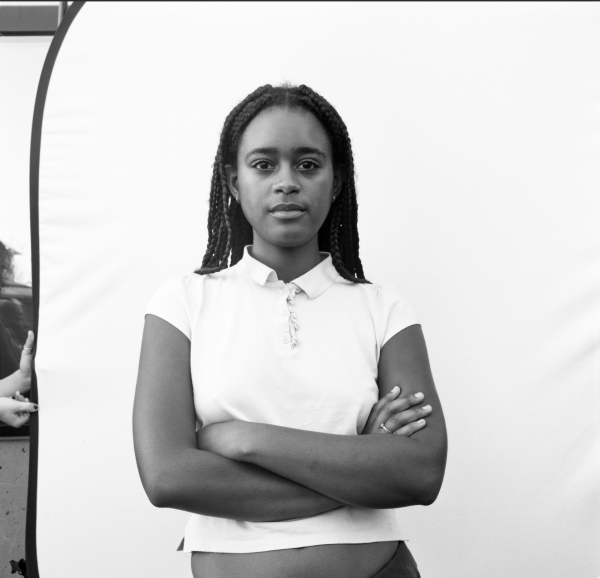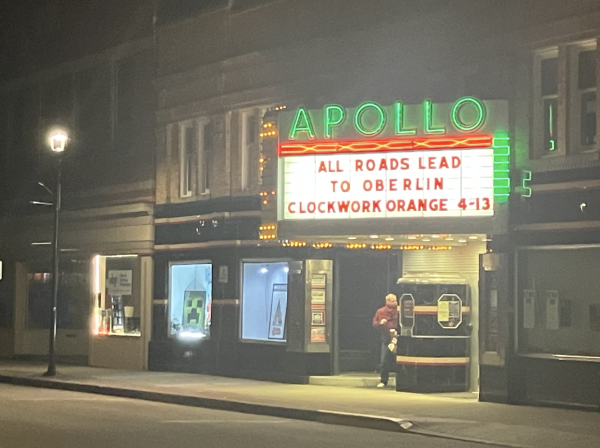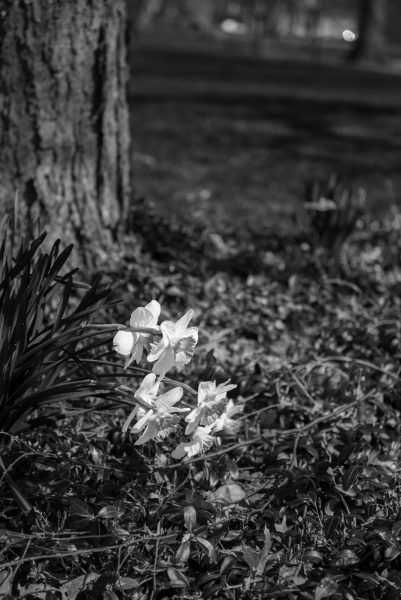Students Reflect on Conflict Kitchen Talk
A week after their event at the Allen Memorial Art Museum on Thursday, May 2, Conflict Kitchen still remains very present on students’ minds. The collaborative art installation, created by artists Jon Rubin and Dawn Weleski, doubled as a functional restaurant in Pittsburgh from 2010 until 2017. Rubin and Weleski, as part of the Allen’s First Thursday series, came to Oberlin to discuss the story behind their long-running piece.
Based between the North and Central Oakland neighborhoods of Pittsburgh, Conflict Kitchen was an attempt by Rubin and Weleski to allow people to explore and interact with various cultures that the United States was in conflict with. The restaurant had a rotating menu inspired by contemporary geopolitics. Each new identity would also feature events and performances meant to augment patrons’ experiences patrons.
“[The goal] is to expand the engagement the public has with the culture, politics, and issues at stake within the focus region,” Conflict Kitchen’s website writes.
“The story of their project was just fascinating,” College sophomore Rachel Wolchok, who attended the event, wrote in an email to the Review. “It was totally different from other art events [at Oberlin] because the artists were here. They were telling their stories rather than their analysis or scholastic thoughts. It was so much more personal than other lectures and touched me in different ways. The artists were so obviously passionate and knowledgeable.”
College first-year Chloe Lai also attended and highlighted the project’s originality.
“I’ve mostly seen research presentations which often lead to similar themes,” she wrote in an email to the Review. “But this was interesting because it was an actual restaurant that acted on the topics they researched.”
For some students from Pittsburgh, the art project was already well-known and admired.
“Conflict Kitchen was in the same neighborhood where I went to high school,” College first-year Rebecca Kukushkin wrote in a message to the Review. “I really like[d] the organization because … they show a counter-narrative of the places the U.S. is in conflict with in a really interesting way. It’s not just about the food, but about representation.”
For Kukushkin, the restaurant’s political aspect was helpful for understanding communities she had not interacted with before.
“I went once when the conflict was with Standing Rock, and they were serving food from the Sioux region,” she wrote. “It was the only time I’ve ever had the opportunity to try Native food, and with my meal they gave me some literature about the conflict. It was a really neat way to learn about a community marginalized by the U.S. government, not only politically, but culturally.”
Lai agreed with Kukushkin about the restaurant’s power as a political instrument.
“I found the concept so powerful — using food as a way to better understand others, share stories, and humanize,” she wrote. “I definitely believe in the power of sharing food, and we just need more connections between individuals and acceptance of differences.”
For Wolchok, it was not only the aims of project that impressed her, but how Rubin and Weleski pursued them.
“The depths of this project were astounding,” she wrote. “They had so many outreach initiatives and really tried to connect the people eating food in Pittsburgh to people of the cuisine’s origin. At one point, Conflict Kitchen had actors and actresses who [translated] a conversation between someone in Iran and a customer at the restaurant. The actor would make the conversation between these two people face-to-face, as the person in Iran could hear what the customer was saying and would respond, the actor then speaking the Iranian person’s replies.”
For several attendees, this dedication to breaking down cultural barriers attracted them to last Thursday’s event.
“I am really interested in dialogue, so this was right up my alley,” Wolchok wrote. “The importance of dialogue [was what I took away from the event]. How easy it is to engage with someone’s culture and forget about political struggles and the impact our country has on a person’s daily life. We happily participate in someone’s culture without understanding where it is from and what it means that we are eating their food despite being in war with them.”
Last Thursday’s event was funded through the Ellen H. Johnson Endowed Fund for Contemporary Art and presented in the King Sculpture Court.








